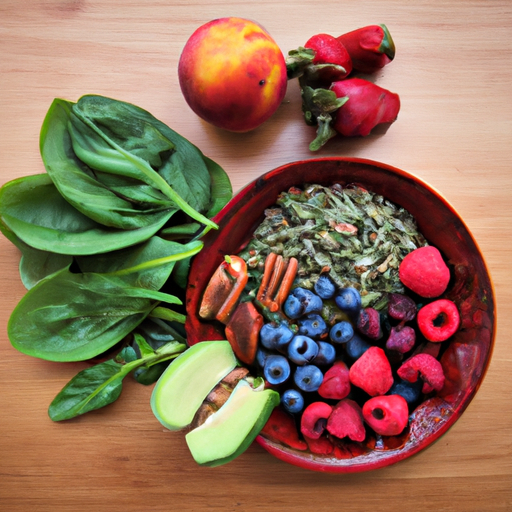In our quest for health and wellness, superfoods have emerged as nutritional powerhouses. Discovering the secrets of these remarkable foods can pave the way for a healthier, more vibrant life.
Understanding Superfoods
Superfoods are nutrient-dense foods known for their exceptional health benefits. But what sets them apart, and how do they work? Essentially, superfoods are rich in vitamins, minerals, antioxidants, and phytonutrients that play crucial roles in maintaining and improving various body functions. These foods are unprocessed and natural, providing the body with essential nutrients without the harm of additives or unhealthy fats. They include a broad variety of fruits, vegetables, grains, and proteins, each with unique properties that can boost your health in specific ways. For instance, berries like blueberries and strawberries offer high levels of antioxidants, which can help mitigate oxidative stress on cells. Leafy greens like spinach and kale are loaded with vitamins A, C, and K, enhancing immune function and bone health. By incorporating superfoods into your diet, you can optimize your nutrient intake, support bodily functions, and potentially ward off diseases.
Benefits of Antioxidant-Rich Foods
Antioxidants are compounds that protect your cells from the damaging effects of free radicals, which can lead to chronic diseases and aging. Foods high in antioxidants can combat these effects, promoting overall health. Berries, such as blueberries, strawberries, and goji berries, are renowned for their high antioxidant content. These fruits are packed with vitamin C, flavonoids, and phytochemicals, contributing to improved heart health, brain function, and glowing skin. Similarly, nuts and seeds like almonds and flaxseeds are rich in vitamin E and other antioxidants, essential for protecting cells and supporting immune function. Dark chocolate, in moderate amounts, is another delicious source of antioxidants, particularly flavonoids, which have been shown to improve vascular health. By prioritizing antioxidant-rich foods, you can boost your body&8217;s defense against oxidative stress, reduce inflammation, and minimize the risk of chronic illnesses such as heart disease, diabetes, and cancer.
Powerhouses of Fiber
Fiber is crucial for digestive health, but its benefits span much further. It aids in weight management, reduces the risk of cardiovascular diseases, and helps maintain stable blood sugar levels. Superfoods such as whole grains, legumes, fruits, and vegetables are excellent sources of dietary fiber. Oats, for example, are rich in beta-glucan, a soluble fiber known to lower cholesterol levels and improve heart health. Beans and lentils provide a mix of soluble and insoluble fiber, which aids digestion and promotes a feeling of fullness, making it easier to manage weight. Fruits like apples, pears, and berries add soluble fiber to your diet, helping to regulate blood sugar and cholesterol. Leafy greens and cruciferous vegetables, including broccoli and Brussels sprouts, contribute insoluble fiber, which maintains regular bowel movements and prevents constipation. Incorporating a variety of these fiber-rich superfoods can enhance your digestive health, support cardiovascular function, and regulate metabolic processes, leading to overall improved wellbeing.
Omega-3 Fatty Acids and Their Sources
Omega-3 fatty acids are essential fats that the body cannot produce on its own. They are vital for brain health, reducing inflammation, and preventing heart disease. Fish such as salmon, mackerel, and sardines are among the richest sources of omega-3s, particularly EPA and DHA, which are directly associated with reduced risk of cardiovascular diseases and improved cognitive function. For those following a plant-based diet, flaxseeds, chia seeds, and walnuts are excellent alternatives, providing ALA, a type of omega-3 that the body can partially convert into EPA and DHA. Including omega-3 rich foods in your diet can support brain development and function, decrease triglyceride levels, reduce blood pressure, and lower the risk of heart diseases. Additionally, these healthy fats have been found to alleviate symptoms of depression and anxiety, showcasing their broad impact on both physical and mental health. Regular consumption of omega-3-rich superfoods is essential for maintaining long-term health and wellbeing.
The Role of Phytochemicals
Phytochemicals are naturally occurring compounds in plants that contribute to their color, flavor, and disease resistance. These compounds have potent health benefits, including anti-inflammatory, anti-cancer, and antioxidant properties. Cruciferous vegetables like broccoli, Brussels sprouts, and kale contain sulforaphane, a potent antioxidant known for its cancer-fighting properties. Tomatoes are rich in lycopene, a powerful phytochemical that helps protect against prostate and breast cancers. Citrus fruits, such as oranges and lemons, are abundant in flavonoids, which have anti-inflammatory and immune-boosting effects. Furthermore, garlic contains allicin, a compound with both antimicrobial and cardiovascular health benefits. Grapes, especially red and black varieties, provide resveratrol, which supports heart health and longevity. Incorporating a variety of phytochemical-rich superfoods into your diet can enhance immune function, protect against chronic diseases, and provide a natural defense system for the body. These compounds work synergistically with other nutrients to offer a holistic approach to health and wellness.
